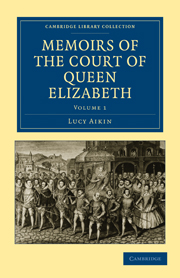Book contents
- Frontmatter
- PREFACE
- CHAPTER I 1533 TO 1536
- CHAPTER II 1536 TO 1542
- CHAPTER III 1542 TO 1547
- CHAPTER IV 1547 TO 1549
- CHAPTER V 1549 TO 1553
- CHAPTER VI 1553 AND 1554
- CHAPTER VII 1554 AND 1555
- CHAPTER VIII 1555 TO 1558
- CHAPTER IX 1558 AND 1559
- CHAPTER X 1559
- CHAPTER XI 1560
- CHAPTER XII 1560
- CHAPTER XIII 1561
- CHAPTER XIII 1561 TO 1565
- CHAPTER XIV 1565 AND 1566
- CHAPTER XV 1567 AND 1568
- CHAPTER XVI 1568 TO 1570
- Frontmatter
- PREFACE
- CHAPTER I 1533 TO 1536
- CHAPTER II 1536 TO 1542
- CHAPTER III 1542 TO 1547
- CHAPTER IV 1547 TO 1549
- CHAPTER V 1549 TO 1553
- CHAPTER VI 1553 AND 1554
- CHAPTER VII 1554 AND 1555
- CHAPTER VIII 1555 TO 1558
- CHAPTER IX 1558 AND 1559
- CHAPTER X 1559
- CHAPTER XI 1560
- CHAPTER XII 1560
- CHAPTER XIII 1561
- CHAPTER XIII 1561 TO 1565
- CHAPTER XIV 1565 AND 1566
- CHAPTER XV 1567 AND 1568
- CHAPTER XVI 1568 TO 1570
Summary
There was no part of the regal office the exercise of which appeared so likely to expose Elizabeth to invidious reflections, as that which comprehended the management of ecclesiastical affairs. Few divines, though protestant, could behold without a certain feeling of mingled jealousy and disdain, a female placed at the head of the religion of the country, and by the whole papal party such a supremacy was regarded perhaps as the most horrible, certainly as the most preposterous, of all the prodigies which heresy had yet brought forth. “I have seen the head of the English church dancing!” exclaimed, it is said, with a sarcastic air, an ambassador from one of the catholic courts of Europe.
A more striking incongruity indeed could scarcely be imagined, than between the winning manners and sprightly disposition of this youthful princess, as they displayed themselves amid the festivities of her court and the homage of her suitors, and the grave and awful character of Governess of the church, with which she had been solemnly invested.
In virtue of this office, it was the right and duty of the queen to choose a religion for the country; to ordain its rites and ceremonies, discipline, and form of church government; and to fix the rank, offices and emoluments of its ministers. She was also to exercise this power entirely at her own discretion, free from the control of parliament or the interference of the clerical body, and assisted only by such commissioners, lay or ecclesiastical, as it should please herself to appoint.
- Type
- Chapter
- Information
- Memoirs of the Court of Queen Elizabeth , pp. 302 - 331Publisher: Cambridge University PressPrint publication year: 2010First published in: 1818



